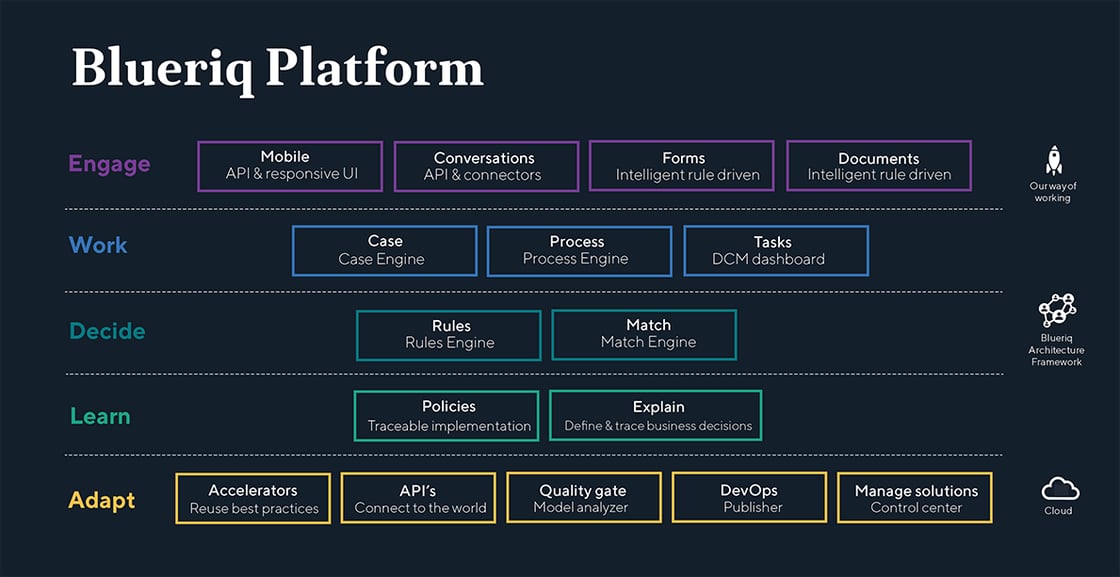We know our technology inside out and love to share it with business engineers, architects and developers. Take a look at our roadmap and see what we're working towards now. Or check out our Research page and get an idea of our research projects.
Each item on our roadmap is linked to one of the categories within our platform, namely Engage, Work, Decide, Learn and Adapt. You can see on this image what each category enables. And so we are continuously enriching that, as you can see in our roadmap.

Release: 17.2
Undo/redo for adjustments in Encore
Release: 16.10
We create insight into the profile at a chosen point in a flow of a Blueriq web service.
Release: 17.5
We make it even easier to invoke a Blueriq web service.
Release: 17.7
Improved data integrity through control over whether 'null' values sent or received by Blueriq APIs/applications are accepted.
Release: 17.6
Faster innovation through automated modeling steps for invoking and creating JSON-based REST services.
Planned for: May 2025
Release: tbd
We will add the ability to gain insight into the performance of Blueriq applications and their interactions with other systems.
Planned for: April 2025
Release: tbd
By providing an overview of unused elements in Encore, these can be removed from a model, resulting in a higher-quality model. This improves maintainability and reduces costs for maintenance and new features.
Planned for: December 2024
Release: tbd
Making Dynamic Case Management easier to model.
Planned for: August 2025
Release: tbd
We are introducing new features that allow users collaborating in Blueriq to easily gain insight into the current status of their work. Whether it's work that still needs to be done, work in progress, or completed work – with this new functionality, everyone stays up to date.
Planned for: November 2025
Release: tbd
The rise of design systems marks an important step in the professionalization of web design, and we at Blueriq see this development as a perfect match with the way our front-ends are developed. Design systems provide consistent, recognizable structures that enhance the user experience, enable component reuse, and contribute to the efficiency and quality of applications.
Planned for: October 2024
Release: tbd
Data synchronized across multiple sources from the Case Engine is stored together to improve backup capabilities.
We create insight into the profile at a chosen point in a flow of a Blueriq web service.

Why
The debug tools that Blueriq already offers include the ability to view the profile with instances, relationships, and attribute values from a page. However, the lack of pages in Blueriq web services means that this profile insight is missing. Therefore, we aim to provide this insight for web services as well.
What
It will be possible to take a snapshot of the profile at any point in a flow. This snapshot will be written to a designated log file. Additionally, it will be possible to read these snapshots back into Blueriq Encore, for example, to test your logic or data mapping.

Why
As part of our ongoing effort to improve user experience for Blueriq Encore users, it is now time to support the highly requested functionality: undo/redo. This will enhance the sense of control and freedom for the Business Engineer by making it easier to recover from mistakes during modeling.
What
It will be possible for Business Engineers to undo changes made in Blueriq Encore. In addition to the existing ability to undo a 'pending change' at the element level and cancel unsaved changes, the undo feature will be more refined: it will allow for step-by-step reversal of multiple user actions within an element.
We make it even easier to invoke a Blueriq web service.

Why
We are seeing an increase in the use of REST services. In the absence of a contract between the calling and serving parties, as seen with SOAP, connecting to a REST web service often turns into a trial-and-error process. Blueriq already provides an OpenAPI feed for this, but there is room for improvement.
What
We will expand the ability to add OpenAPI descriptions in various places. Additionally, we will enhance the readability of the OpenAPI specification by grouping operations.
Faster innovation through automated modeling steps for invoking and creating JSON-based REST services.

Why
The design-time import of an XSD or WSDL file to create or call a SOAP service has been available for years in the Blueriq platform. This functionality has proven itself time and again: it saves time, enables faster innovation at lower costs, and makes the business engineer's work easier and more enjoyable.
What
Despite the growing popularity of JSON-based services, calling and creating them is still a manual process. To minimize this cumbersome, time-consuming, and error-prone task, we are implementing an import feature for calling and creating JSON-based REST services.
Improved data integrity through control over whether 'null' values sent or received by Blueriq APIs/applications are accepted.

Why
Although the value 'null' is not recognized in the Blueriq profile, we still encounter it through REST messages. Currently, an incoming 'null' in Blueriq is always accepted and interpreted as a value that has been intentionally left empty: user set unknown. The inability to reject a 'null' value is currently not easily possible, and we want to change that to gain more control over the data that enters the Blueriq profile.
What
We will make it possible to specify for each field (in a domain schema) whether 'null' is allowed. This choice will be adopted during the OpenAPI import and communicated in the OpenAPI feed to the outside world as well.
By providing an overview of unused elements in Encore, these can be removed from a model, resulting in a higher-quality model. This improves maintainability and reduces costs for maintenance and new features.

Why
By providing an overview of unused elements in Encore, these can be removed from a model, resulting in a higher-quality model. This improves maintainability and reduces costs for maintenance and new features.
What
The solution provides the Business Engineer in Blueriq Encore with an overview of unreachable elements. An element is considered unreachable if it cannot be recursively found via an exposed flow or web service. It will also be possible to manually mark elements as reachable, for example, in cases where these elements are used in custom implementations.
We will add the ability to gain insight into the performance of Blueriq applications and their interactions with other systems.

Blueriq applications are often mission-critical and play a central role in our customers' IT landscapes. Due to their strategic position in complex environments, performance issues can have a significant impact. However, identifying the root cause of these bottlenecks is not always straightforward. Delays often occur in connections to other systems or databases, but pinpointing the exact bottleneck can be challenging.
We are introducing new features that allow users collaborating in Blueriq to easily gain insight into the current status of their work. Whether it's work that still needs to be done, work in progress, or completed work – with this new functionality, everyone stays up to date.
Why is this important?
Blueriq is increasingly supporting systems where collaboration is central. In this context, it is essential that users always have access to the most up-to-date information and the status of their work. This applies both to tasks that still need to be completed and to work that is in progress or already finished. Since Blueriq provides intelligent systems, this information is already available within the system. It is now time to actively share this data with users so they can stay up-to-date.
What can you expect?
We are developing a system that allows users in Blueriq to receive notifications directly when relevant changes occur, for example, in a case they are involved in. Whether it's about completing cases or tasks, or making it clear who is editing which information, we will ensure that the right people are always informed. The first use cases we will support include locking and unlocking a case, updating task/case lists, and updating notes on a case.
Making Dynamic Case Management easier to model.

The rise of design systems marks an important step in the professionalization of web design, and we at Blueriq see this development as a perfect match with the way our front-ends are developed. Design systems provide consistent, recognizable structures that enhance the user experience, enable component reuse, and contribute to the efficiency and quality of applications.
Why are we doing this?
At Blueriq, we have years of experience defining and reusing components within our models, ensuring a high level of adaptability and consistency. This includes interaction components like container types, fields, presentation, and content styling. This aligns seamlessly with the principles of design systems, which focus on components, UX patterns, and design tokens. More and more of our clients are translating their design systems into Blueriq models, and we are making this translation even easier. By intelligently combining our Blueriq UI elements, we enhance flexibility, improve maintenance, and strengthen the consistency of your Blueriq interaction models.
What are we planning?
With support for design systems in Blueriq, we are providing you with the tools to leverage the power of consistent styling and layout components. By combining these elements in the right way, there are ample opportunities to implement UX patterns that elevate the user experience. And because we further decouple pages from the data, you can easily distribute your design system across all your projects. This ensures consistency and flexibility, both now and in the future.
Data synchronized across multiple sources from the Case Engine is stored together to improve backup capabilities.

Why
From a DCM application, several data sources are relevant. For example, a case file and a process are stored. A backup strategy can become complex because these sources need to remain in sync, even during restoration. As a result, backups can only be made by bringing the environments down.
What
The source data related to a case (used in Case Modelling) will be stored in a new SQL data store (using a single technology), making it easier to create (hot) backups and restore a complete case.
Documentation, how-to's and the ability to ask questions, you'll find it all on the Blueriq Community. The Community is for anyone working with or interacting with Blueriq and is openly available.
To the Blueriq Community
Do you have questions about new developments or are you curious about all the possibilities of the Blueriq platform?
If so, please contact Yuri.